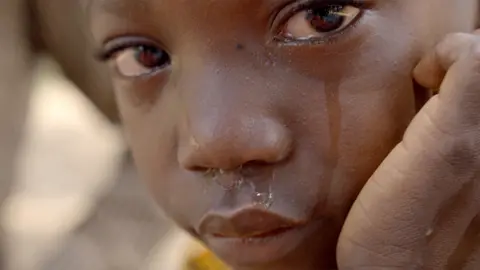 Gift Ufuoma / BBC
Gift Ufuoma / BBCAn Islamic school teacher, Masud Abdulrasheed, is struggling to come to terms with the killing of his seven-year-old daughter in drone strikes by Nigeria’s military during a religious festival in their large but sparsely populated village exactly a year ago.
The military said the bombing was caused by “a failure of intelligence”, leading the army to mistake the open-air festival in Tudunbiri for a gathering of jihadist fighters.
“The incident of December 3rd, 2023 was a great tragedy that shouldn’t have happened,” military spokesman Maj-Gen Edward Buba told the BBC. “The armed forces regret that incident. And if we could bring the lives lost back, we would.”
Warning: This story contains graphic details which some readers may find distressing
About 85 people were killed, including Mr Abdulrasheed’s little daughter Habeebah, when unmanned drones dropped two bombs on the village in northern Kaduna state.
“The first bomb dropped on us at around 10 pm, close to a tree where women and children were seated,” Mr Abdulrasheed recalled. “We ran for safety, but moments later we gathered to help those injured and also called for help, but the second bomb was dropped and it killed more people.”
Mr Abdulrasheed described Habeebah as “the most caring among my children”.
“She would always give me whatever gift she was given, even if I didn’t need it,” he told the BBC.
The 36-year-old was one of the organisers of the annual festival, known as Maulud, held to celebrate the birth of Prophet Muhammad.
Many of his students were killed in the tragedy.
“We saw dead bodies all over the place as if they were sleeping. Body parts were strewn around the tree branches and rooftops. We had to pack them inside sacks and buried all the dead in a mass grave.
“There is nothing more devastating than seeing people you invited for a celebration coming to meet their end. I am so heartbroken,” Mr Abdulrasheed said.
As the father of four spoke to the BBC, he sat his second daughter, Zaharau, beside him on a mat outside their home. He gently pulled up her top to show a wound on her stomach.
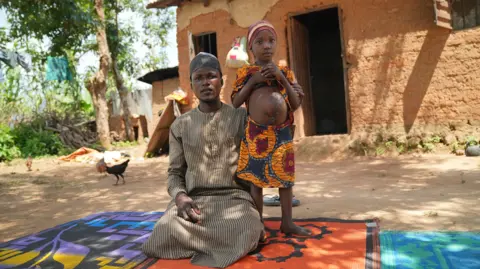 Gift Ufuoma / BBC
Gift Ufuoma / BBCFour-year-old Zaharau was hit by shrapnel. It took at least an hour to drive her and the other wounded to the nearest hospital in Kaduna city.
Although she underwent surgery, her wound still hasn’t fully healed.
“When my daughter and the others that got injured were at the hospital, they were well taken care of. We thank the government for that.
“But things changed after they got discharged, months later. The hospital has refused to continue with their [free] treatment. They keep giving us excuses.”
Walking around Tudunbiri, there is hardly a family not affected by the tragedy of that fateful night.
Twenty-year-old Aisha Buhari lost three of her younger brothers. She survived, suffering an injury to her left arm that is yet to heal.
Sitting on a stool, she cried and wiped her tears with her hijab as she recalled the last moments of her brothers.
“That night, I just finished talking with them and stepped away for a moment when the first bomb hit, only for me to see their dead bodies on the ground moments later,” Ms Buhari said.
“When they rushed me to the hospital, I could not think of anything but my brothers. I cried so much.”
As Ms Buhari spoke, she paused to wipe the pus oozing from her wound.
“There was no house or farm task I could not do before the incident, but now I can’t do anything properly. I depend on people to help with something as basic as washing clothes,” she said.
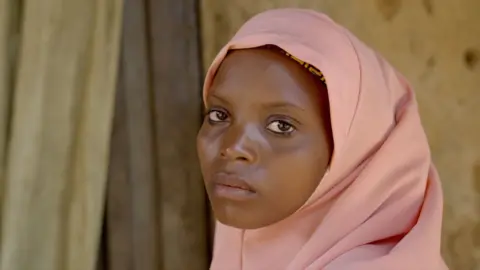 Gift Ufuoma / BBC
Gift Ufuoma / BBCKaduna state governor Uba Sani told the BBC that he would look into the plight of villagers like Ms Buhari.
“Thank you BBC for this information. I will personally go back to Tudunbiri, and if I find people that still need treatment, I will take care of it,” he promised.
“The instruction I gave was that all the injured should be treated and none of them should be discharged until they are fully recovered,” he added.
Undeterred by last year’s tragedy, the Muslim faithful in Tudunbiri celebrated the festival again this year, but held it two months earlier.
The occasion also marked the inauguration of a mosque the authorities have built for them over the bomb site, as a form of compensation.
Mr Abdulrasheed acts as the mosque’s imam as the previous one was killed in the air strikes.
“We are happy about the new mosque, but we can never forget what happened,” Mr Abdulrasheed told the BBC. “Any time I come here, I always remember that day, and I feel depressed. As we celebrate this year’s Maulud, we also mourn those that we lost.”
For years, Nigeria’s military has been battling armed jihadists and criminals, who raid villages and kidnap people for ransom in parts of the north.
This has led to an upsurge in air strikes aimed at targeting them.
The Nigerian Air Force has obtained “a multitude” of new aircraft, the editor of Defence Web, Guy Martin, told the BBC.
This included Chinese-built unmanned aerial vehicles (UAVs), commonly known as drones.
“Chinese UAVs are cheaper, making them more accessible. Nearly a third of African countries have acquired UAVs, mainly from Turkey and China,” Mr Martin said, pointing out that it was strikes from UAVs that caused the disaster in Tudunbiri.
“Intelligence failure, poor coordination, and inadequate operator training are some of the reasons for erroneous strikes. The rapid deployment of UAV technology often outpaces the development of proper training and engagement protocols for military personnel,” Mr Martin added.
Maj-Gen Buba told the BBC that the military had found itself operating in a “challenging and complex” operational environment.
“But we have grown in our equipment holding and in our deployments of more experienced commanders and troops,” he said.
According to consulting firm SBM Intelligence, the Nigerian Air Force carried out 17 accidental air strikes between January 2017 and September 2024, killing more than 500 people.
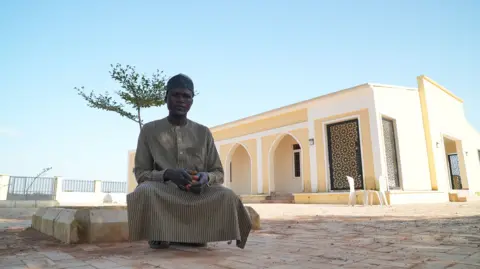 Gift Ufuoma / BBC
Gift Ufuoma / BBC“One mistake is enough; when we see hundreds being killed in erroneous attacks, we should be concerned,” Human Rights Watch (HRW) Nigeria researcher Anietie Ewang said.
In response, Maj-Gen Buba said that rights campaigners should “give us more credit for being more transparent, for working with the people, and for being more accountable for our actions, as was revealed particularly during the Tudunbiri incident”.
“We will do everything possible to ensure that this never happens [again],” Maj-Gen Buba added.
He said that two army personnel were being court-martialled over the incident and while the case was still in progress, the military had redeployed them and relieved them of their command.
Both the federal and state government have also unveiled development projects for the village as part of efforts to show remorse for the deaths, with Sani telling the BBC that the construction of a hospital and skills acquisition centre was almost complete.
“We have been supporting the people of Tudunbiri, and we will continue to do that,” he said.
“They are my people,” the governor added.
But in a cruel irony, more than 20 people in the village reported that their farmland had been confiscated for the projects.
They include 50-year-old Hashim Abdullahi, who told the BBC: “I am not happy because this hospital has taken my means of livelihood and I was not compensated. I have been rendered jobless and can’t provide for my family.”
In response, Sani said: “For the people that genuinely have land, the department of land in Kaduna is working with the head of the community to ensure that the right people are given their land back.”
Nigeria’s Vice-President Kashim Shettima also visited the village following the killings, promising – in conjunction with the state government – justice and financial compensation.
People were told they would receive 2.5 million naira ($1,500; £1,180) for each person killed in their family, while those injured were offered about 750,000 naira ($500).
“It is a difference that authorities actually carried out compensation this time around, but there is a sense that it has been very arbitrary,” Ms Ewang said.
“We need to see the authorities take much-needed action towards justice, accountability, and compensation for victims in all of the other incidents of air strikes where they have accepted it was an error,” she added.
Ms Buhari told the BBC that her family had received the 7.5 million naira for her three brothers who were killed, and she got 750,000 naira for her injuries – though this was not enough.
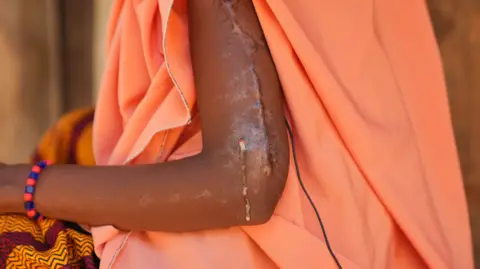 Gift Ufuoma / BBC
Gift Ufuoma / BBC“I usually buy drugs at a pharmacy to dress the wound because that’s all I can afford to do now. The hospital doesn’t attend to us any more. Sometimes the pain would be very severe for weeks,” she said.
“We hope the government will come to our aid again so that I can get proper care for my arm. I can’t wait to use it again,” Ms Buhari added.
Mr Abdulrasheed told the BBC he had not received financial compensation for the injuries suffered by his four-year-old.
“I always feel worried when I look at her condition,” he said.
He said he had received the full financial compensation for the death of his seven-year-old, but no amount of money could replace her.
“Every time I visit the grave site, I remember those we used to live together with but now they are no more. I miss them all. I miss my daughter.”
Additional reporting by the BBC’s Yusuf Akinpelu.
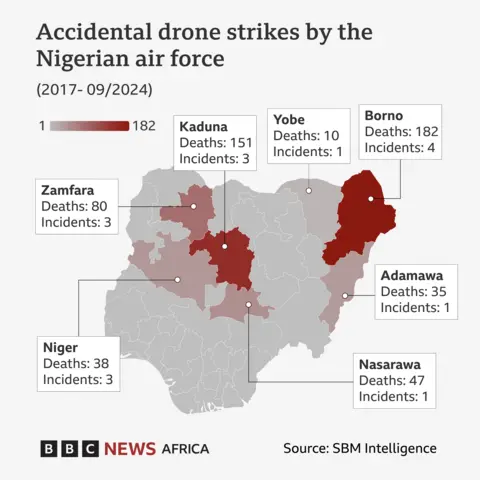
More Nigeria stories from the BBC:
 Getty Images/BBC
Getty Images/BBC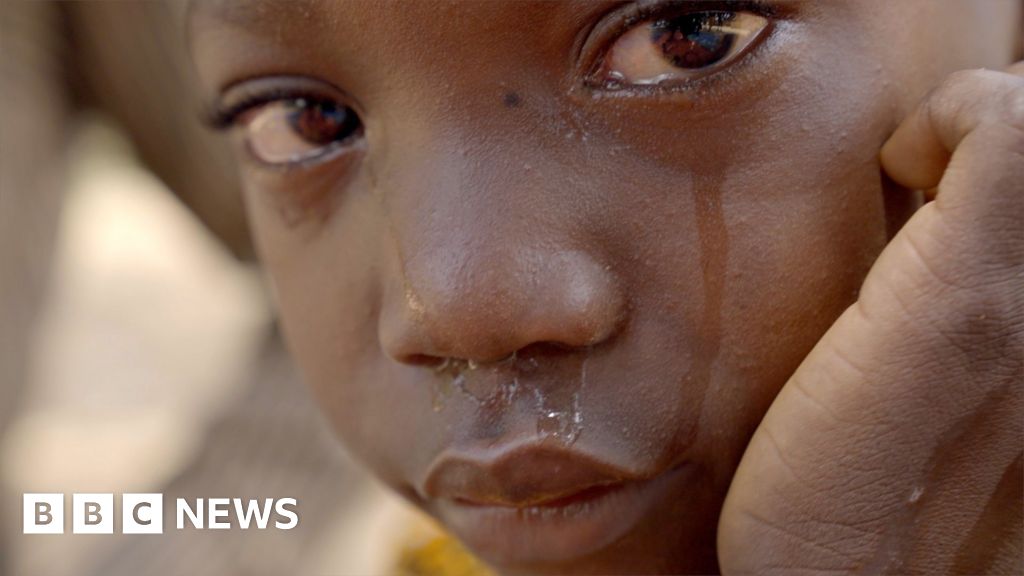

Leave a Reply